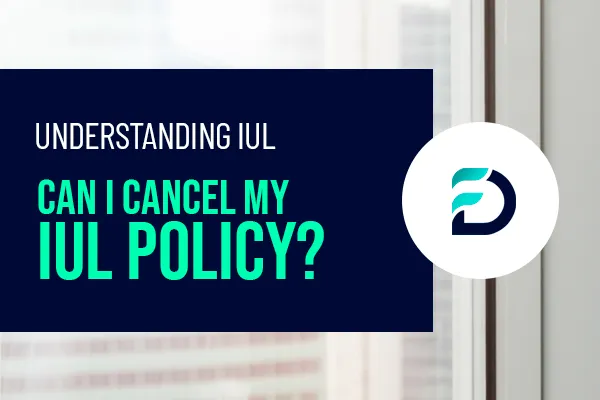Life Insurance Blogs
Life Insurance Blogs

Can I Cancel My IUL Policy?

Are you considering canceling your Indexed Universal Life (IUL) policy? Whether you've had a change in financial circumstances, are unhappy with the policy's performance, or simply have different insurance needs now, it's important to understand your options before making a decision. In this article, we will explore the process and implications of canceling an IUL policy.
Understanding IUL Policies
Indexed Universal Life (IUL) policies have gained popularity in recent years due to their potential for cash accumulation and flexibility. These policies combine the benefits of a traditional life insurance policy with an investment component tied to the performance of a market index, such as the S&P 500. Unlike traditional whole life insurance policies, IUL policies offer the potential for higher returns and the ability to adjust the death benefit and premium payments over time.
However, it's crucial to understand the specifics of your IUL policy before considering cancellation. Each policy is unique, and the terms and conditions can vary significantly. Familiarize yourself with the policy documents, including the surrender charges, fees, and any potential tax implications. This knowledge will help you make an informed decision about canceling your IUL policy.
If you want to know everything about IUL Policies, click here to access our IUL Master Guide.
Reasons for Cancelling an IUL Policy
There are various reasons why individuals may choose to cancel their IUL policies. One common reason is a change in financial circumstances. If you're facing financial hardship or have experienced a significant life event, such as a job loss or divorce, you may need to reassess your insurance needs. In such cases, canceling your IUL policy might seem like a viable option to reduce expenses.
Another reason for canceling an IUL policy is dissatisfaction with its performance. While IUL policies offer the potential for higher returns, they are still subject to market fluctuations and may not meet your expectations. If the policy hasn't performed as anticipated, you may be tempted to cancel it and explore other investment opportunities.
Lastly, some individuals cancel their IUL policies simply because their insurance needs have changed. Perhaps you've reached a point where you no longer require the same level of coverage, or you've found a more suitable policy that aligns with your current circumstances. Whatever the reason, it's essential to carefully evaluate your situation before canceling your IUL policy.
Potential Drawbacks of Cancelling an IUL Policy
Before making a decision, it's crucial to be aware of the potential drawbacks of canceling an IUL policy. One significant consideration is the surrender charges associated with early termination. IUL policies typically have a surrender period, during which canceling the policy can result in substantial penalties. These charges can eat into the cash value, reducing the amount you receive upon cancellation.
Additionally, canceling an IUL policy may have tax consequences. If you've accumulated cash value within the policy, surrendering it could trigger taxable income. It's important to consult with a tax professional to understand the potential tax implications and plan accordingly.
Another drawback of canceling an IUL policy is the loss of potential future benefits. By canceling, you forfeit the death benefit protection and the potential for continued cash accumulation. If your circumstances change again in the future and you need life insurance coverage, you may face challenges obtaining a new policy or securing the same favorable terms.

Alternatives to Cancelling an IUL Policy
Before deciding to cancel your IUL policy, it's worth exploring alternatives that may better suit your needs. One option is to modify your existing policy. You can consider adjusting the premium payments, death benefit, or investment allocation to better align with your current goals. Modifying the policy may allow you to maintain coverage while addressing any specific concerns you have.
Another alternative is to utilize the cash value within your IUL policy. If your policy has accumulated a significant cash value, you may be able to access it through policy loans or withdrawals. This can provide you with immediate funds while keeping the policy intact. However, it's essential to consider the potential impact on the death benefit and any tax implications before making this decision.
Alternatively, you can explore the option of exchanging your IUL policy for a different type of life insurance policy. This could involve converting it into a term life insurance policy or exploring other permanent life insurance options that better suit your current needs. Consult with an insurance professional to evaluate the viability of this option based on your specific circumstances.
What Happens If the Market Goes Down? Understanding Indexed Universal Life Insurance (IUL) Policies
Evaluating Your Financial Needs and Goals
When considering canceling your IUL policy, it's crucial to evaluate your financial needs and long-term goals. Determine whether the policy still aligns with your current situation and objectives. Consider factors such as your overall financial health, projected future expenses, and the level of life insurance coverage you require.
It's also essential to assess your risk tolerance and investment preferences. If you're dissatisfied with the performance of your IUL policy, consider whether alternative investment opportunities align better with your risk appetite and financial goals. Understanding your personal financial landscape will help you make an informed decision about canceling your IUL policy.
Assessing the Surrender Value of Your IUL Policy
Before canceling your IUL policy, it's crucial to assess the surrender value. The surrender value represents the cash value of the policy that you would receive upon cancellation. Take the time to understand how surrender charges and fees impact the surrender value. This evaluation will help you determine the potential financial implications of canceling your IUL policy.
Additionally, consider whether the surrender value can be utilized in a more efficient way. For example, if you have outstanding debts or financial obligations, using the surrender value to address those may provide more immediate benefits than canceling the policy entirely. Carefully evaluate the potential uses of the surrender value before making a final decision.
The Process of Cancelling an IUL Policy
Canceling an IUL policy involves several steps. Start by reviewing your policy documents to understand the cancellation process outlined by your insurer. Some policies may require a written request, while others may have specific forms to complete. Follow the instructions provided by your insurer to initiate the cancellation process.
Once you've submitted the necessary documentation, the insurer will review your request and process the cancellation. Be prepared for a waiting period, as it may take some time for the cancellation to be finalized. During this period, it's essential to maintain any premium payments required to keep the policy in force until the cancellation is complete.
Considerations Before Cancelling an IUL Policy
Before canceling your IUL policy, consider the long-term implications and potential alternatives. Evaluate the surrender charges, tax consequences, and the impact on your future financial goals. Assess whether modifying the policy, utilizing the cash value, or exploring other life insurance options might better suit your needs.
It's crucial to seek professional advice before making a final decision. Consult with a financial advisor or insurance professional who can provide guidance based on your unique circumstances. They can help you evaluate the potential benefits and drawbacks of canceling your IUL policy and ensure it aligns with your overall financial strategy.
Seeking Professional Advice Before Making a Decision
When it comes to canceling an IUL policy, it's essential to make an informed decision. Seek professional advice from experts in the field, such as financial advisors or insurance professionals. They can provide a comprehensive assessment of your situation and guide you through the process, considering the various factors involved.
Remember, the information provided in this article is for informational purposes only and should not replace professional advice. Each individual's circumstances are unique, and it's crucial to consult with professionals who can provide personalized guidance based on your specific needs.
Conclusion
Canceling an IUL policy is a significant decision that should not be taken lightly. Before canceling, carefully evaluate your financial needs, goals, and alternatives. Understand the surrender charges, potential tax consequences, and the impact on your future financial objectives. Seek professional advice to ensure that your decision aligns with your overall financial strategy. By taking these steps, you can make an informed choice that best suits your current situation and long-term objectives.
Get In Touch


